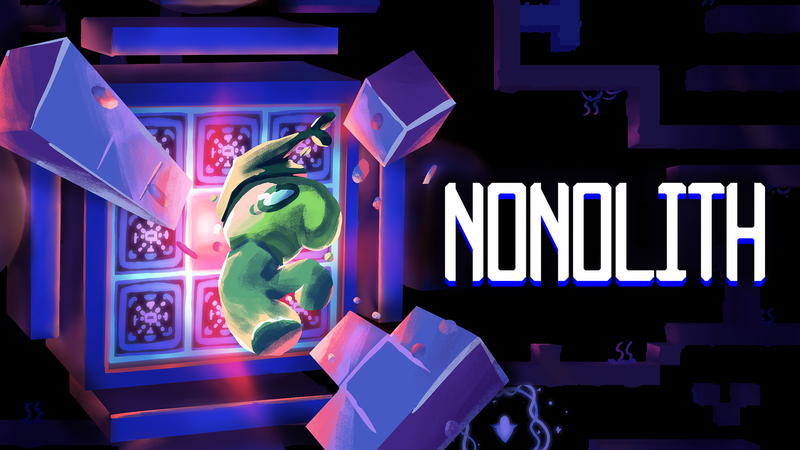Platonic caught my attention quickly — vibrant, low-poly environments, intriguing contraptions, a mysterious atmosphere. Its biggest inspirations are readily apparent. Since trying out the original Myst a few years ago, however, I can't help but feel a little apprehensive when approaching such games. I know, it's totally unreasonable for a much-loved classic to make me nervous about all the games that followed, yet I can’t help but hope that Platonic has left the more outdated elements behind. Fingers crossed.
The game opens with a cacophony of noise and bright light, transporting you to the surface of a planetoid, floating in some kind of abstract space. Imposing black tablets seem to follow you around when you're not looking — not the only time this game will toy with your sense of space. After stumbling across one such tablet and tracing a triangle on its surface (reminiscent of a certain line-drawing puzzle game), you are cast out to explore Platonic's mysterious worlds.
My initial exploration of these five pocket-sized worlds, each themed after a different Platonic solid, left me with a nagging sense of unfinished business; unused clues, contraptions with unwarranted complexity, and spaces that felt a little too empty. Surely there's more to all this? Well, as it turns out, there is. As I explored further, gradually piecing together the incomprehensible notes scrawled on my whiteboard, these worlds slowly revealed their hidden and surprising depths.
Platonic's puzzles take many forms: all kinds of curious devices and mechanisms, elaborate puzzle boxes, and interfaces for inputting codes. You'll need to experiment, make lateral connections, and employ plenty of logical reasoning to find solutions. The game will rarely surrender simple codes that neatly fit the locks you’ve found — you'll need to decipher, transform, and apply them in creative ways. I found every puzzle fair, relying only on your ability to reason through them and not, as is often the case in these kinds of games, on having to guess what the developer was thinking. Only a couple of puzzles felt a little uninspired, but were overshadowed by the many other great puzzles.
One particularly memorable puzzle is built around a sequence of floating rooms connected by corridors. In the center of each room is a control panel, allowing you to rotate a nearby corridor to form a path between two other floating rooms. Step by step, you'll reason your way to the final room, disassembling and reassembling your path as you go, only to be delivered a wonderful twist that will make you completely reevaluate the puzzle you've just solved.
In a similar way, you’ll use many of the other devices you encounter to manipulate the physical world around you, as you build paths and bridges to explore further. However, in some cases, the effects aren’t particularly clear, especially when they happen out of view. On occasion, I found myself wondering if changes to the environment actually made any sense or if the game was just screwing with my sense of space again. Even now, there’s still one such mechanism that perplexes me.
Like other games that ask you to piece together disparate information, Platonic does suffer from the "have I missed something?" problem. You may find yourself scouring every polygon (and occasionally getting stuck in the collision geometry) in search of that one piece of information you surely need because… what else is there to do? My advice: you probably didn't miss anything — it's time to get creative with what you do know.
One of the game's later puzzles (don't worry, no spoilers) is especially inventive and elaborate, expecting you to notice common patterns and systems underlying much of what you've encountered. The non-linearity of this section allows for the necessary discoveries to be made out of order. For me, this resulted in a jumbled up mental model, making it extra difficult to solve. I certainly admire the ambition of its design, however, and for those players who do work through it in the intended order, it seems to be a standout puzzle.
Platonic drew me in with its environments and contraptions, then repeatedly surprised me as the many layers of mystery began to unfold. Despite its few rough edges, Platonic is a thoroughly engaging experience. It’s clear that both Platonic and the recent Sensorium (another low-poly puzzle adventure with five areas to explore, hmmm…) have learned a great deal from modern puzzle design, delivering a logically satisfying experience while still capturing the mystery and intrigue that is central to the Myst-like genre. Maybe I should give some of those earlier games another shot.







